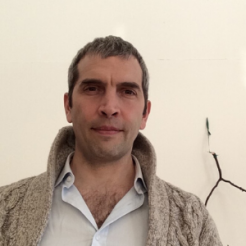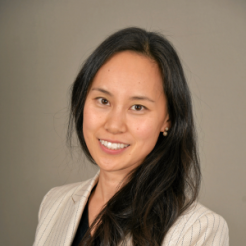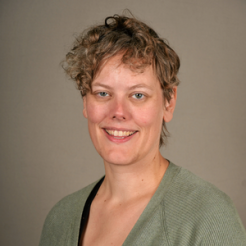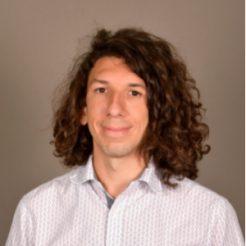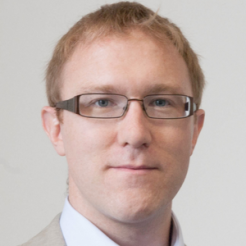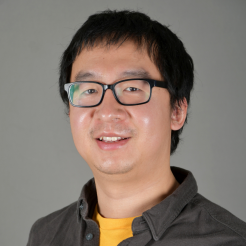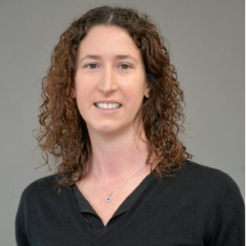Applications for the 2024-25 academic year are now closed.
Please check back in Autumn 2024 for applications for the 2025-26 academic year.
Franklin students work on highly interdisciplinary projects across our Themes with real-world impact, world-leading research supervisors, access to industrial collaborations and top universities from across the UK and beyond-state-of-the-art technologies.
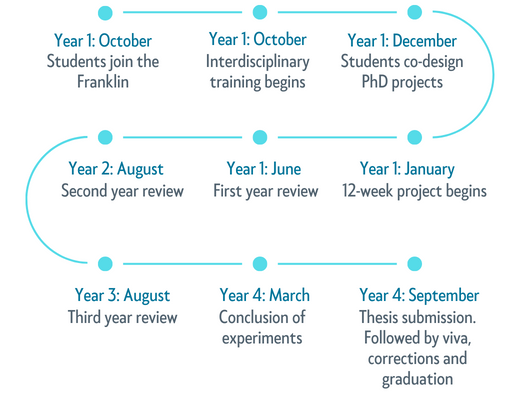
Programme timeline
Students will be primarily based in our Franklin Hub at Harwell for the duration of their PhD.
As the Franklin does not hold degree-awarding powers, in their first year, students will be registered with our training partner, University of Edinburgh. In addition to completing training, including courses with Edinburgh and Franklin-specific training in our Themes, first-year students will develop a 12-week research project from a catalogue of possible ideas. These will be highly innovative projects centred around the Franklin technologies and be in collaboration with university academics. Following the evaluation of this Year 1 project, students will then register at their primary external supervisor’s university for Years 2-4, which will become the awarding body for their degree (e.g. if a student’s primary external supervisor is based at University of Manchester, this will become the awarding university for their PhD).
Projects
Early during their time at the Franklin, students will receive a catalogue of potential ideas for their PhD projects, from which they are asked to shortlist their preferred options and to research and compose short proposals outlining how they would take the research forward. The ideas in the project catalogue are very much starting points, as students are expected and encouraged to take an active role in co-developing their assigned idea into an interdisciplinary research project, informed by their time spent rotating around the Franklin’s various scientific themes during their first weeks on programme. Initially, students will have the opportunity to explore their research idea via the mini 12-week project that takes place from January. Following evaluation of this mini project in the Spring, students will have the opportunity to either develop it into a full PhD project, incorporating recommended revisions, or to explore an alternative project idea over the summer. In pursuing their research, students will work with a supervisory team comprising academics that are both internal and external to the Franklin, including a primary internal supervisor and a primary external supervisor.
International students will be registered with University of Edinburgh throughout their time at the Franklin and so must select a project with a University of Edinburgh academic supervisor.
Funding
The Franklin PhD programme is fully funded by UKRI-EPSRC for four years, where successful students will be offered:
- Tax-free stipend of £20,560 each year for four years
- ‘Home’ tuition fees for their entire degree
- All associated project, conference and publication costs
- Free bus travel or free parking
- Free affiliate student societies / club membership to a college from University of Oxford (please note that this does not include access to university accommodation, nor will our students be registered at University of Oxford)
Affiliations
Our collaborators include research institutes, universities and industrial companies from across the breadth of the UK. For the PhD programme, we are collaborating with Franklin member and non-member universities. Some of our PhD collaborators are shown here:
Although Franklin students will have a cross-institutional supervisory team, they will spend the majority of their time in our central Hub in Harwell Campus (Oxfordshire), to ensure that they have access to the resources and technologies which will be instrumental for their research. However, occasional visits to their awarding university and other external facilities are expected.
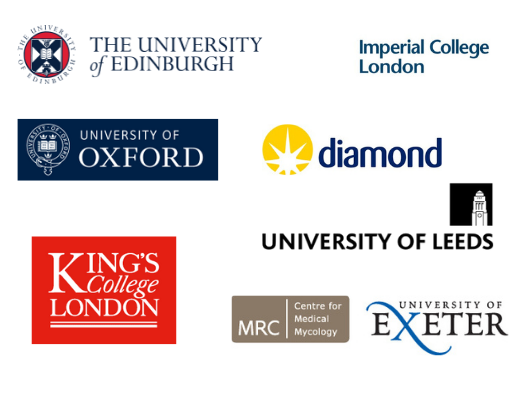
Supervision
Franklin students will each have a supervisory panel throughout their PhD journey. This includes Franklin academics and university co-supervisors. Each student will also have a personal tutor to meet with informally on a frequent basis. Our Early Careers Lead, who manages the PhD programme, will also be supporting students’ experience and professional development.
There are many potential supervisors available at the Franklin, some of which are pictured below. Supervisors for this cohort’s PhD projects are yet to be confirmed and other potential supervisors can be found on our people’s page.
Potential PhD supervisors
Professor Ben Davis
Science Director, Next Generation Chemistry
University of Oxford
Ben Davis got his B.A. (1993) and D.Phil. (1996) from the University of Oxford. During this time he learnt the […]
Dr Mark Basham
Science Director, Artificial Intelligence and Informatics
Dr Mark Basham is Head of AI at the Rosalind Franklin Institute, and a Research Fellow at Diamond Light Source. […]
Professor Angus Kirkland
Science Director, Correlated Imaging
University of Oxford
Angus Kirkland completed his MA and PhD at the University of Cambridge using high resolution electron microscopy to study the […]
Dr Judy Kim
Deputy Science Director, Correlated Imaging
University of Oxford
Judy Kim is the Deputy Science Director of Correlated Imaging at the Rosalind Franklin Institute and Departmental Lecturer in the […]
Dr Michele Darrow
Head of Data Strategy for Cryo Electron Imaging
Michele received her PhD from Baylor College of Medicine in Houston, TX for her work using cryo electron tomography and […]
Dr Marcus Gallagher-Jones
Associate Investigator
Marcus received his BSc in Biochemistry from Durham University and his PhD in Biophysics from the University of Liverpool. For […]
Dr Tobias Starborg
Senior Support Scientist
Toby completed a PhD at the University of Manchester examining collagen fibril deposition and organisation. He then worked as a […]
Associate Professor Shabaz Mohammed
Deputy Science Director, Next Generation Chemistry
University of Manchester
Shabaz Mohammed is the Deputy Science Director for Next Generation Chemistry and Head of Mechanistic Proteomics, and also teaches at […]
Professor Andrew Baldwin
Head of Biomolecular NMR
Andrew is Head of Biomolecular NMR and Professor of Chemistry at the University of Oxford. He is interested in developing […]
Dr Liang Wu
Wellcome Trust Sir Henry Dale fellow
Liang is a Wellcome Trust Sir Henry Dale fellow. He is establishing a lab to study the processes involved in […]
Dr Michael Grange
Tomography Group Leader
Michael completed his D.Phil in structural biology at the University of Oxford, UK, applying in-cell structural biology techniques to investigate […]
Dr Lucile Moynie
Associate Investigator
After completing her PhD in Structural Biology, Lucile moved to St Andrews to join Jim Naismith’s laboratory as a research […]
